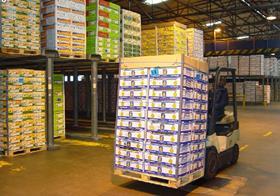
The South African citrus industry has expressed concern at the uncertainty surrounding the threat of Citrus Black Spot (CBS) interventions, bringing confusion to a market that has been relatively stable in terms of supply in recent years.
According to industry sources, this has been exacerbated by congestion at the Port of Durban this season, as well as a lack of export containers and low shipping capacity.
Uncertainty over what could happen in Europe if the CBS tolerance is exceeded is forcing some growers into markets where in the past they have not been strong traders, while those who are free of CBS risk, but have been focusing on other markets in the past, have now entered Europe.
“The export industry can at best be described as unsettled,” one exporter tells Eurofruit. “We do not quite know how things will pan out between now and the end of the year.”
Weak currency
The weak South African currency, which has dropped by almost 25 per cent over the past few months, is driving this year’s exports to the traditional markets. While apple and pear growers are finding strong markets in the UK and western Europe, the uncertainty over possible black spot interventions are preventing citrus growers from doing the same.
It is unlikely that the rand will improve much soon, and there are underlying factors which are keeping the currency at its present level of more than R15.00 to the British pound and R13.00 to the euro. Although it also dropped to below R10.00 to the US dollar, these markets cannot match the returns South African growers can get in Europe.
In addition, South Africans are nervously awaiting news on the condition of former President Nelson Mandela, who is in a critical condition in hospital. The 94 year-old iconic statesman is such an influential figure, that analysts fear that his death could add to the instability of the currency.
No notifications
The South African citrus industry has said that so far, there have been no official notifications of consignments from South Africa intercepted for CBS in the EU. The Citrus Growers’ Association (CGA) last week distributed its fourth CBS Bulletin, covering inspections in orchards, in packhouses and at ports of discharge and entry.
“So far 182 (0.78 per cent) of the 23,062 EU registered orchards have been deregistered due to CBS finds, while 13 (0.8 per cent) of the 1,602 production units registered for the EU have been deregistered,' the CGA revealed. 'To date there have still been no official notifications of consignments from South Africa intercepted for CBS in the EU.'
While the South African industry is still hopeful that it will get through the season without trouble, exporters say that many of them have had to change marketing plans for fear of running into problems when their fruit arrives in Europe.
“We simply cannot take any changes,” said Van Doorn’s Max le Roux.
A GoReefers spokesperson described the citrus season so far as, logistically, the most difficult it has ever experienced.
“There is a culmination of factors which not only has to do with growers having to change their plans because of CBS, which is affecting the industry,' the spokesperson noted. 'The demand for containers, the fact that the apple and pear industry is shipping the maximum fruit to the strong British and European markets to maximise exchange rate advantages, and fact that South African citrus growers are using more containers opposed to the traditional conventional shipping method to Russia, are causing major problems.”
Shipping companies have also introduced smaller vessels because they predicted that less South African citrus would be shipped to Europe. The port of Durban is reported to be heavily congested as it also has to deal with fruit that, in the past, moved through Maputu in Mozambique.
One exporter confirmed that in order to increase shipping opportunities from Durban, citrus fruit had been transported to South America, then back to the port of Coega near Port Elizabeth in South Africa, where it was again transshipped to Europe.
Shipments of citrus fruit in containers to Russia have reportedly increased dramatically this year. This, according to exporters, puts additional pressure on the availability of containers. In the past shippers to Russia have mostly used the Baltic Line’s conventional reefers vessels.
At the start of the season Southern Africa predicted a 106m carton export crop. While this estimate has dropped slightly, there are fears that the final export figure will drop considerably if solutions for the logistical problems are not found soon.



